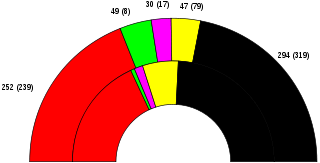
German federal election, 1994
Encyclopedia
The 13th German federal election, 1994 was conducted on October 16, 1994, to elect members to the Bundestag
(parliament) of the Federal Republic of Germany
.
. First out of three candidates (the others were Gerhard Schröder
and Heidemarie Wieczorek-Zeul
) came Rudolf Scharping
, Minister-President of Rhineland-Palatinate
.Tension between Scharping and other SPD leaders Oskar Lafontaine
and Gerhard Schröder
hampered his campaign.
For the first time the Green party seemed to be willing to actually join a government in case that a SPD - Green coalition would have the majority.
¹ Totals for the Greens reflect the merger of the Western and Eastern Green parties.

as chancellor.
The PDS was able to gain four direct seats and was therefore eligible for full caucus status and proportional representation even though it remained below the 5% margin.
Bundestag
The Bundestag is a federal legislative body in Germany. In practice Germany is governed by a bicameral legislature, of which the Bundestag serves as the lower house and the Bundesrat the upper house. The Bundestag is established by the German Basic Law of 1949, as the successor to the earlier...
(parliament) of the Federal Republic of Germany
Germany
Germany , officially the Federal Republic of Germany , is a federal parliamentary republic in Europe. The country consists of 16 states while the capital and largest city is Berlin. Germany covers an area of 357,021 km2 and has a largely temperate seasonal climate...
.
Issues and Campaign
The SPD let its members elect a candidate for Chancellor against Helmut KohlHelmut Kohl
Helmut Josef Michael Kohl is a German conservative politician and statesman. He was Chancellor of Germany from 1982 to 1998 and the chairman of the Christian Democratic Union from 1973 to 1998...
. First out of three candidates (the others were Gerhard Schröder
Gerhard Schröder
Gerhard Fritz Kurt Schröder is a German politician, and was Chancellor of Germany from 1998 to 2005. A member of the Social Democratic Party of Germany , he led a coalition government of the SPD and the Greens. Before becoming a full-time politician, he was a lawyer, and before becoming Chancellor...
and Heidemarie Wieczorek-Zeul
Heidemarie Wieczorek-Zeul
Heidemarie Wieczorek-Zeul is a German politician and a member of the Social Democratic Party since 1965.-Career:...
) came Rudolf Scharping
Rudolf Scharping
Rudolf Scharping is a German politician .Scharping studied politics, sociology and law at the University of Bonn. He joined the Social Democratic Party in 1966. He was Member of the Rhineland-Palatine Parliament from 1975 to 1994. From 21 May 1991 to 15 October 1994 he was prime minister of the...
, Minister-President of Rhineland-Palatinate
Rhineland-Palatinate
Rhineland-Palatinate is one of the 16 states of the Federal Republic of Germany. It has an area of and about four million inhabitants. The capital is Mainz. English speakers also commonly refer to the state by its German name, Rheinland-Pfalz ....
.Tension between Scharping and other SPD leaders Oskar Lafontaine
Oskar Lafontaine
Oskar Lafontaine is a German politician, former German finance minister, former chairman of the Social Democratic Party and former Minister-President of the state of Saarland. Since 2007 he was co-chairman of The Left...
and Gerhard Schröder
Gerhard Schröder
Gerhard Fritz Kurt Schröder is a German politician, and was Chancellor of Germany from 1998 to 2005. A member of the Social Democratic Party of Germany , he led a coalition government of the SPD and the Greens. Before becoming a full-time politician, he was a lawyer, and before becoming Chancellor...
hampered his campaign.
For the first time the Green party seemed to be willing to actually join a government in case that a SPD - Green coalition would have the majority.
Results
| Party | Party List votes | Vote percentage (change) | Total Seats (change) | Seat percentage | |||
|---|---|---|---|---|---|---|---|
| Christian Democratic Union (CDU) | 16,089,960 | 34.2% | -2.5% | 244 | -24 | 36.3% | |
| Christian Social Union (CSU) | 3,427,196 | 7.3% | +0.2% | 50 | -1 | 7.4% | |
| Free Democratic Party Free Democratic Party (Germany) The Free Democratic Party , abbreviated to FDP, is a centre-right classical liberal political party in Germany. It is led by Philipp Rösler and currently serves as the junior coalition partner to the Union in the German federal government... (FDP) |
3,258,407 | 6.9% | -4.1% | 47 | -32 | 7.0% | |
| Social Democratic Party Social Democratic Party of Germany The Social Democratic Party of Germany is a social-democratic political party in Germany... |
17,140,354 | 36.4% | +2.9% | 252 | +13 | 37.5% | |
| Alliance '90/The Greens Alliance '90/The Greens Alliance '90/The Greens is a green political party in Germany, formed from the merger of the German Green Party and Alliance 90 in 1993. Its leaders are Claudia Roth and Cem Özdemir... ¹ |
3,424,315 | 7.3% | +2.3% | 49 | +41 | 7.3% | |
| Party of Democratic Socialism (PDS) | 2,066,176 | 4.4% | +2.0% | 30 | +13 | 4.5% | |
| All Others | 1,698,766 | 3.6% | 0 | 0.0% | |||
| Totals | 47,105,174 | 100.0% | 672 | +10 | 100.0% | ||
¹ Totals for the Greens reflect the merger of the Western and Eastern Green parties.

Post-election
The coalition between the CDU/CSU and the FDP was able to continue in power with Helmut KohlHelmut Kohl
Helmut Josef Michael Kohl is a German conservative politician and statesman. He was Chancellor of Germany from 1982 to 1998 and the chairman of the Christian Democratic Union from 1973 to 1998...
as chancellor.
The PDS was able to gain four direct seats and was therefore eligible for full caucus status and proportional representation even though it remained below the 5% margin.

